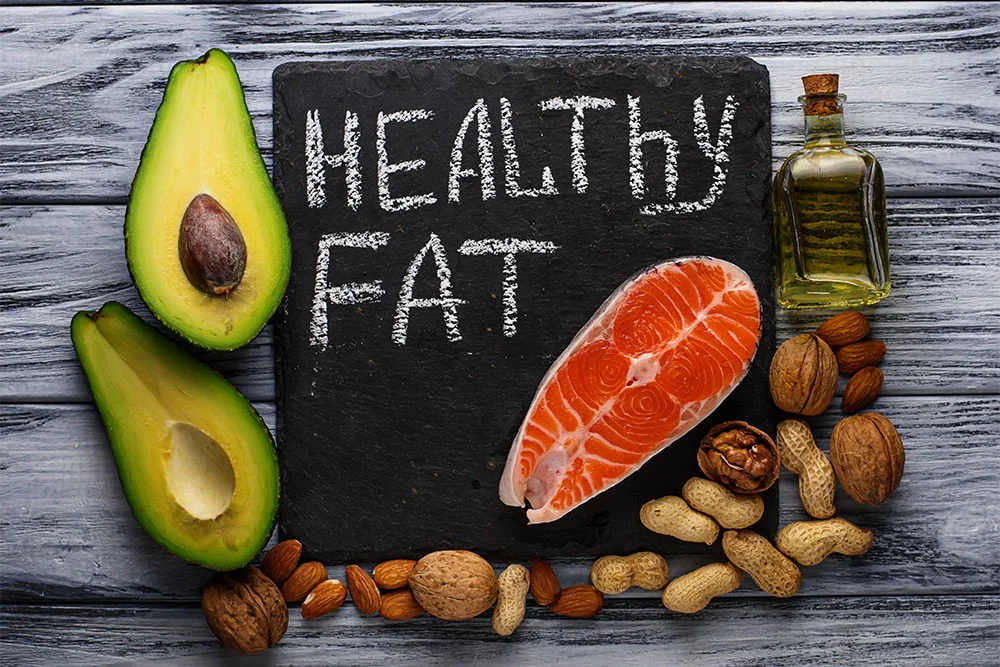In the late 1950s, there was a significant paradigm shift that changed our views on nutrition and health: the idea that fat, specifically saturated fat, in foods caused heart disease. Ancel Keys, an American physiologist, led the now discredited Seven Countries Study that examined the link between dietary fat and cardiovascular disease.
Keys ultimately unveiled his diet-heart hypothesis that saturated fat raises blood cholesterol, which in turn, increases the occurrence of coronary heart disease and the risk of heart attack.

The Pervasive Diet-Heart Hypothesis and Low-Fat Diet
Keys concluded that the saturated fats found in butter, eggs, whole milk, cheese, and red meat were harmful to the heart and should be avoided. With such negative views on meat and dairy, food companies initiated a new movement for low-fat, “heart-healthy” foods. Fats were removed from food and replaced with a better-tasting substitute, sugar. Though low-fat foods are now more palatable, they’re often too high in refined carbohydrates and have unfavorable health effects. Low-fat foods tend to be less filling which make you feel hungry faster, and they ironically cause people to gain more weight over time. The body also turns these unhealthy carbohydrates into excess fat and higher triglycerides, a cardiovascular risk factor. The low-fat, high-carb diet—now considered unhealthy—and Keys’ much-debated study has resulted in a renewed interest in saturated fats and new studies that reveal these fats are not the culprit of heart disease after all.
Saturated Fats Versus Trans Fats
Dietary fat is essential. It’s what gives our bodies energy, helps us absorb vitamins and minerals, and makes us feel full. Cholesterol, too, plays a vital role in helping the body function properly. The key, though, is the type of fat that is consumed and how it affects cholesterol levels.
Saturated fats occur naturally in whole, unprocessed foods (e.g., raw milk), animal, and plant sources. Current studies show some saturated fats—lauric and myristic acids—can actually help improve the HDL and LDL cholesterol ratios. Saturated fats also help construct cell membranes and hormones, boost the immune system, facilitate calcium absorption, help protect the liver from toxins, and are essential for healthy brain function. These types of fats are found in avocados, wild fish, nuts, grass-fed beef, free-range eggs, and whole milk.
Trans fats, on the other hand, are manufactured by adding hydrogen to vegetable oil to make it more solid. Most partially hydrogenated trans fats are found in processed foods and increase the “bad” LDL cholesterol and lower the “good” HDL levels. Trans fats are certainly not considered heart-healthy and should be avoided. These types of fats are found in doughnuts, pies, cookies, French fries, and fried foods.
Wiseman Health Take-Home Advice
Our goal is to help you incorporate the right balance of healthy fats and healthy foods into your diet in order to achieve optimal health. Below are pointers for a balanced, natural diet—foods that are heart-healthy and high in saturated fats. Remember that moderation is key with a healthy diet.
- Start by eliminating processed foods, processed fructose, and sugar.
- Aim to eat whole foods, such as raw vegetables, that retain their natural nutrients.
- Buy organic and go with transparent food brands that avoid GMOs (genetically modified organisms).
- Incorporate avocados into salads or eat them by themselves.
- Eat nuts such as almonds, walnuts, cashews, and pistachios.
- Avoid vegetable oils and margarine and replace them with coconut oil.
- Consume organic, grass-fed beef and other high-quality animal protein such as wild fish. Avoid farm raised fish.
- Eat local, true free-range eggs WITH the yolk.
- Bring whole-dairy products back into your diet, including butter made from raw, grass-fed milk and cheese (e.g., cheddar and soft goat’s cheese). Instead of non-fat or low-fat milk, drink the WHOLE-MILK variety that contains the healthy saturated fat. The goal, of course, is to get as close as you can to raw when consuming dairy products and this includes drinking raw milk from grass-fed cows. Watch our YouTube experience at Stryk Jersey Farm to learn more about the health benefits of raw, untreated milk.
- Don’t forget to round out your diet by drinking filtered water!
Editor’s Note: This content was created by our Wiseman Health content and writing team, without the influence of artificial intelligence engines. Our goal is to be your trusted source for natural health and medical information. This article was originally published on May 3, 2016 and has since been updated.
Raw Milk with Wiseman Family Practice. Retrieved April 19, 2016 from https://www.youtube.com/watch?v=QTzzNFP5yk4
Bobrow, R. S. (2015, November 18) Why Low-Fat Diets Make You Fat (And Unhealthy). huffingtonpost.com. Retrieved April 19, 2016 from http://www.huffingtonpost.com/robert-s-bobrow-md/why-low-fat-diets-make-you-fat-and-unhealthy_b_8506608.html
The Health Benefits of Raw Milk. raw-milk-facts.com. Retrieved April 19, 2016 from http://www.raw-milk-facts.com/raw_milk_health_benefits.html
Collins, S. C. (2015, January) Eat Nuts—They Do a Heart Good. todaysdietician.com.
Retrieved April 19, 2016 from http://www.todaysdietitian.com/newarchives/011315p12.shtml
Aubrey, A. (2014, February 12) The Full-Fat Paradox: Whole Milk May Keep Us Lean. npr.org. Retrieved April 19, 2016 from http://www.npr.org/blogs/thesalt/2014/02/12/275376259/the-full-fat-paradox-whole-milk-may-keep-us-lean
Aubrey, A. (2014, September 01) Cutting Back on Carbs, Not Fat, May Lead to More Weight Loss. npr.org. Retrieved April 19, 2016 from http://www.npr.org/sections/thesalt/2014/09/01/344315405/cutting-back-on-carbs-not-fat-may-lead-to-more-weight-loss
Siri-Tarino, et al. (2010, January) Meta-analysis of prospective cohort studies evaluating the association of saturated fat with cardiovascular disease. ajcn.nutrition.org. Retrieved April 19, 2016 from http://ajcn.nutrition.org/content/early/2010/01/13/ajcn.2009.27725.abstract
Mayo Clinic Staff. (2015, June 19) Trans fat is double trouble for your heart health. mayoclinic.org. Retrieved April 19, 2016 from http://www.mayoclinic.org/trans-fat/art-20046114
DeLacey, E. Food Myths Debunked: All Saturated Fats Raise Blood Cholesterol. fitday.com. Retrieved April 20, 2016 from http://www.fitday.com/fitness-articles/nutrition/healthy-eating/food-myths-debunked-all-saturated-fats-raise-blood-cholesterol.html

Nice artical!